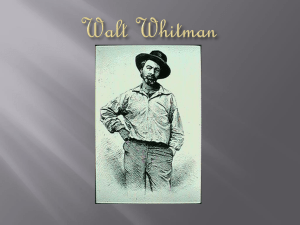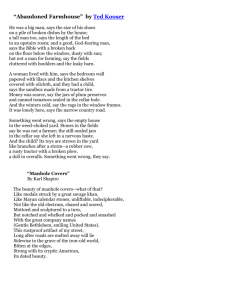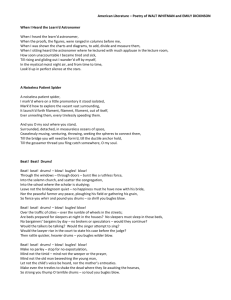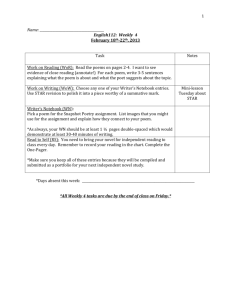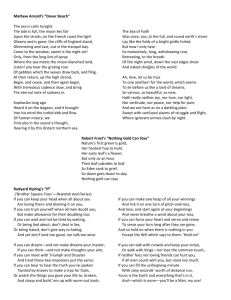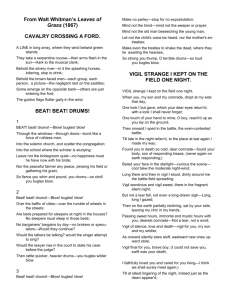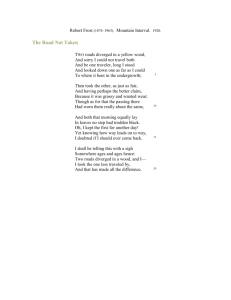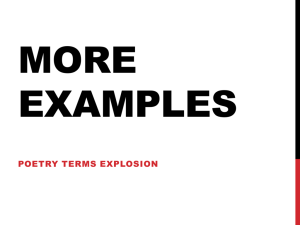Poetry Analysis: Meter, Rhythm, and Meaning
advertisement
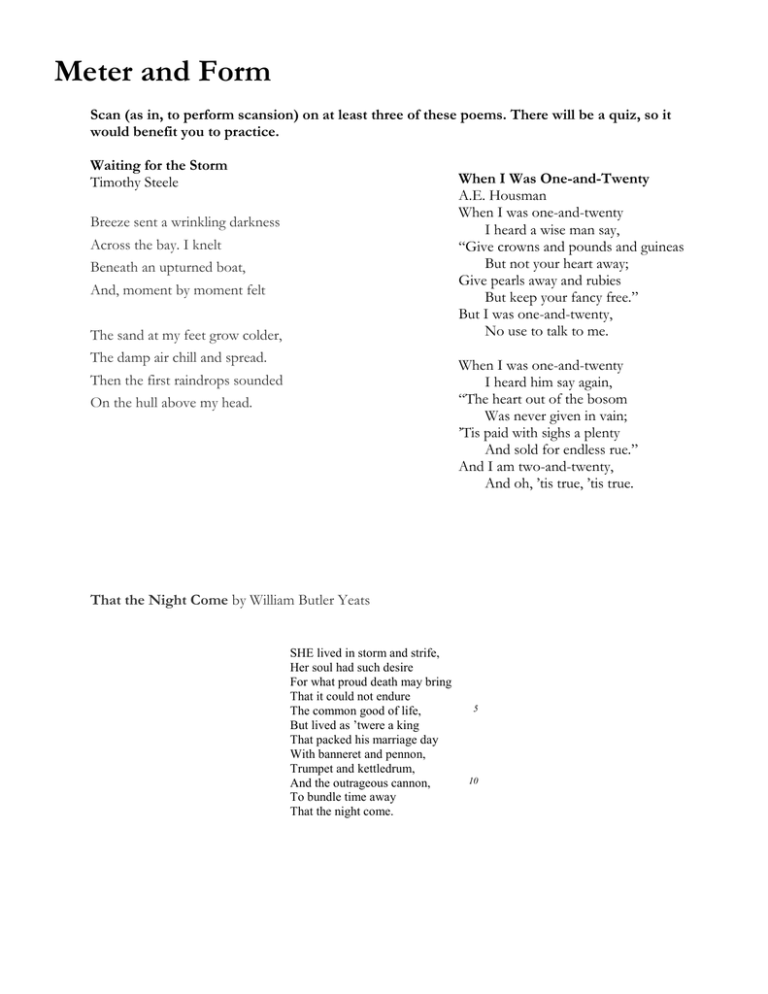
Meter and Form Scan (as in, to perform scansion) on at least three of these poems. There will be a quiz, so it would benefit you to practice. Waiting for the Storm Timothy Steele When I Was One-and-Twenty A.E. Housman When I was one-and-twenty I heard a wise man say, “Give crowns and pounds and guineas But not your heart away; Give pearls away and rubies But keep your fancy free.” But I was one-and-twenty, No use to talk to me. Breeze sent a wrinkling darkness Across the bay. I knelt Beneath an upturned boat, And, moment by moment felt The sand at my feet grow colder, The damp air chill and spread. Then the first raindrops sounded On the hull above my head. When I was one-and-twenty I heard him say again, “The heart out of the bosom Was never given in vain; ’Tis paid with sighs a plenty And sold for endless rue.” And I am two-and-twenty, And oh, ’tis true, ’tis true. That the Night Come by William Butler Yeats SHE lived in storm and strife, Her soul had such desire For what proud death may bring That it could not endure The common good of life, But lived as ’twere a king That packed his marriage day With banneret and pennon, Trumpet and kettledrum, And the outrageous cannon, To bundle time away That the night come. 5 10 Do Not Go Gentle into That Good Night Dylan Thomas Drumming behind you in the High School Band William Trowbridge Do not go gentle into that good night, Old age should burn and rave at close of day; Rage, rage against the dying of the light. Rehearsing in street clothes after school, we measured off the football field in the spice and chill of early fall. Through roll-off, counterpoint, and turn, by the grunt and pop of blocking drill, I marked the cadence of switching hips no martial air could ever hold. How left was left, how right was right! We had a rhythm all our own and made them march to it, slowing "The Stars and Stripes Forever" as the sun stretched our shadows toward the rising moon and my heart kept stepping on my heels. Though wise men at their end know dark is right, Because their words had forked no lightning they Do not go gentle into that good night. Good men, the last wave by, crying how bright Their frail deeds might have danced in a green bay, Rage, rage against the dying of the light. Wild men who caught and sang the sun in flight, And learn, too late, they grieved it on its way, Do not go gentle into that good night. Grave men, near death, who see with blinding sight Blind eyes could blaze like meteors and be gay, Rage, rage against the dying of the light. And you, my father, there on the sad height, Curse, bless, me now with your fierce tears, I pray, Do not go gentle into that good night. Rage, rage against the dying of the light. Sonnet CXVI: Let me not to the Marriage of True Minds William Shakespeare Let me not to the marriage of true minds Admit impediments. Love is not love Which alters when it alteration finds, Or bends with the remover to remove. O no! it is an ever-fixed mark That looks on tempests and is never shaken; It is the star to every wand'ring bark, Whose worth's unknown, although his height be taken. Love's not Time's fool, though rosy lips and cheeks Within his bending sickle's compass come; Love alters not with his brief hours and weeks, But bears it out even to the edge of doom. If this be error and upon me prov'd, I never writ, nor no man ever lov'd. Holy Sonnets: Death, be not proud John Donne Death, be not proud, though some have called thee Mighty and dreadful, for thou art not so; For those whom thou think'st thou dost overthrow Die not, poor Death, nor yet canst thou kill me. From rest and sleep, which but thy pictures be, Much pleasure; then from thee much more must flow, And soonest our best men with thee do go, Rest of their bones, and soul's delivery. Thou art slave to fate, chance, kings, and desperate men, And dost with poison, war, and sickness dwell, And poppy or charms can make us sleep as well And better than thy stroke; why swell'st thou then? One short sleep past, we wake eternally And death shall be no more; Death, thou shalt die. Beat! Beat! Drums! Walt Whitman Beat! beat! drums!—blow! bugles! blow! Through the windows—through doors—burst like a ruthless force, Into the solemn church, and scatter the congregation, Into the school where the scholar is studying, Leave not the bridegroom quiet—no happiness must he have now with his bride, Nor the peaceful farmer any peace, ploughing his field or gathering his grain, So fierce you whirr and pound you drums—so shrill you bugles blow. Beat! beat! drums!—blow! bugles! blow! Over the traffic of cities—over the rumble of wheels in the streets; Are beds prepared for sleepers at night in the houses? no sleepers must sleep in those beds, No bargainers’ bargains by day—no brokers or speculators—would they continue? Would the talkers be talking? would the singer attempt to sing? Would the lawyer rise in the court to state his case before the judge? Then rattle quicker, heavier drums—you bugles wilder blow. Beat! beat! drums!—blow! bugles! blow! Make no parley—stop for no expostulation, Mind not the timid—mind not the weeper or prayer, Mind not the old man beseeching the young man, Let not the child’s voice be heard, nor the mother’s entreaties, Make even the trestles to shake the dead where they lie awaiting the hearses, So strong you thump O terrible drums—so loud you bugles blow. 1. In “Drumming Behind you in the High School Band,” explain how the rhythms of lines relate to their meaning. 2. Pick another poem from this packet and explain how meter/rhythm creates or enhances meaning. Write a well-developed paragraph. *Please note: Do not waste my time and yours with a sloppy paragraph.
